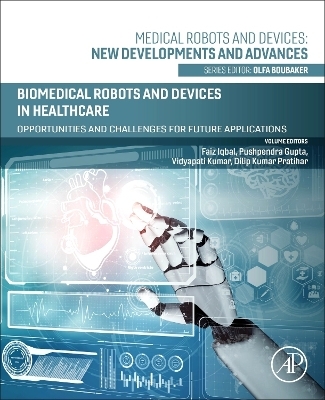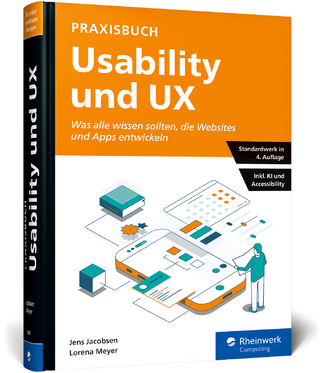
Biomedical Robots and Devices in Healthcare
Academic Press Inc (Verlag)
978-0-443-22206-1 (ISBN)
Dr. Faiz Iqbal received his B.Tech in Mechanical and Automation Engineering in 2011, M.Tech in Mechatronics Engineering in 2013, and PhD in Manufacturing Automation in 2019 from India. He is currently a Lecturer in the School of Engineering at the University of Lincoln in the UK. He has published several research papers and holds four patents, and has received multiple awards for his contributions in research and innovation. His research interests include Mechatronics, Industrial Automation, Smart Manufacturing, Fluidic logic/Soft Robotics, and Industry 4.0. He successfully delivered a COVID-19 project and was awarded the COVID-19 Engineering Medal by the School of Engineering at the University of Edinburgh. Pushpendra Gupta is pursuing a Ph.D. in Mechanical Engineering at the Indian Institute of Technology Kharagpur. He received his M.Tech in Production Engineering (Gold Medalist) in 2015 and B.Tech in Mechanical and Automation Engineering in 2011 from India. He has also worked as a faculty member for 2.5 years at MITRC Alwar before joining IIT Kharagpur. His research interests include humanoid robots, soft computing, evolutionary optimization, and their application in multi-criterion optimization, modeling, and machine learning. Vidyapati Kumar is a Ph.D. candidate in the Department of Mechanical Engineering at the Indian Institute of Technology, Kharagpur. He completed his Master’s in Engineering in Production Engineering in 2018 and Bachelor's in Technology in Mechanical Engineering in 2016. Before starting his Ph.D., he worked for 1.7 years as a project assistant at the CSIR-Central Institute of Mining and Fuel Research. He has published research in SCI/Scopus indexed journals and conference proceedings, and has obtained both an Australian and Indian patent for his innovative research. His research area includes Rehabilitation Robotics, Biomedical devices, and the application of soft computing tools in solving optimization and decision-making problems. Dr. Dilip Kumar Pratihar is a Professor (HAG Scale) in the Mechanical Engineering Department at IIT Kharagpur, India and former Professor-in-charge of the Centre for Excellence in Robotics. He received his BE (Hons.), M.Tech. in Mechanical Engineering, and Ph.D. from various Indian institutions, as well as post-doctoral study at universities in Japan and Germany. He has received multiple awards, including the University Gold Medal, INSA Teachers' Award, Technologist of the Year Award, and Distinguished Alumnus Award. He has made significant contributions to Artificial Intelligence (AI) and its applications in fields such as Industrial Automation, Robotics, Health Care, and Education Technology. He has published several books and hundreds of publications in reputed journals, conferences, and book chapters. He is a regular reviewer for several international journals and a member of the editorial board of several international journals. He has filed patents and received 1 copyright. He is a Fellow of Institution of Engineers, a Senior Member of IEEE, a Member of ASME, and a Member of AMM.
1 Soft Robotics and Computational Intelligence: Transformative Technologies Reshaping Biomedical Engineering
Thomas Gaskins, Pushpendra Gupta, Vidyapati Kumar, DK Pratihar, Faiz Iqbal
2 Application of Multi-Bistatic Frequency-Domain Measurements for Enhanced Medical Sensing and Imaging
Behnaz Sohani*, Amir Rahmani, Aliyu Aliyu
3 Mathematics in Biomedical Robotics and Devices: Opportunities, Challenges, and Potential Impact on Healthcare Delivery
Mo Sadique, Sapna Ratan Shah, Sardar M N Islam*
4 Sensor-enabled Sleep Posture Analysis: State-of-the-art and Opportunities of Wearable Technologies from Clinical, Sensing and Intelligent Perception Perspectives
Omar Elnaggar, Andrew Hopkinson, Frans Coenen, Paolo Paoletti
5 Advancing Ankle-Foot Orthosis Design through Biomechanics, Robotics, and Additive Manufacturing: A Review
Vidyapati Kumar, Pushpendra Gupta, DK Pratihar
6 Comparative Evaluation of Deep Learning Techniques for Multi-Stage Alzheimer's Prediction from Magnetic Resonance Images
Pushpendra Gupta, Pradeep Nahak, Vidyapati Kumar, Dilip Kumar Pratihar*, Kalyanmoy Deb
7 Machine Learning Brain Activation Topography for Individual Skill Classification – Need for Leave One Subject Out (LOSO) Cross Validation
Takahiro Manabe, Anirban Dutta
8 Transfer Learning based Disease Prognosis in Biomedicine 4.0: Challenges, and Opportunities
Senthil Kumar Jagatheesaperumal, Sivasankar Ganesan
9 Advancements in Biomedical devices: A Comprehensive Review
M Ubaid, M Shadab Ahmad, Shanay Rab, Yebing Tian, Faiz Iqbal
10 Voice and chatbot a hybrid framework using XAI for mental health
Debmitra Ghosh*, Sayani Ghatak, Hrithik Paul
11 Wearable Sensors : The pathway to applications of on-body electronics
Viktorija Makarovaite*, Robert Horne
| Erscheinungsdatum | 07.12.2024 |
|---|---|
| Reihe/Serie | Medical Robots and Devices: New Developments and Advances |
| Verlagsort | San Diego |
| Sprache | englisch |
| Maße | 191 x 235 mm |
| Gewicht | 450 g |
| Themenwelt | Mathematik / Informatik ► Informatik ► Datenbanken |
| Informatik ► Software Entwicklung ► User Interfaces (HCI) | |
| Informatik ► Theorie / Studium ► Künstliche Intelligenz / Robotik | |
| Medizin / Pharmazie ► Physiotherapie / Ergotherapie ► Orthopädie | |
| Technik ► Medizintechnik | |
| ISBN-10 | 0-443-22206-1 / 0443222061 |
| ISBN-13 | 978-0-443-22206-1 / 9780443222061 |
| Zustand | Neuware |
| Informationen gemäß Produktsicherheitsverordnung (GPSR) | |
| Haben Sie eine Frage zum Produkt? |
aus dem Bereich


